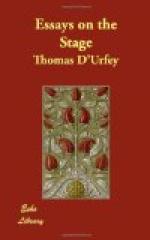That Moroseness of humour, which Some in great good manners have of late been pleased to fix upon the English as their peculiar Character, might possibly be thought to dispose us to a blameable Extreme of Rigor in these matters. And therefore a Forreign Authority was artificially enough brought in, to reproach our pretended Niceness and Austerity. But when the Arguments of this Reply are observed to carry the Point as high, as even the so much upbraided View it self; All but the Willfully blind must see, that even the Gayeties of France could not endure the Corruptions of the Modern Theatres. And that the Complaints against such detestable Abuses are not due to any Quality of the Climate, or particular turn of Temper; but to the common and uniform Principles of Christianity and Virtue, which are the same in every Nation, professing to be governed by them.
To give that Discourse a better face, it is introduced by way of Letter from a Worthy Divine of the Church of England; and published before a late Play called Beauty in Distress. [Footnote: P. IX. X. XXVI.] Tis said to be approved, and recommended by that Reverend Person, for the satisfying some Scruples, whether a man may Lawfully write for the Stage. For a full Resolution whereof the doubting Poet is referred to this Discourse, as that which is presumed to come fully up to his purpose. But we are not told, whether the Divine or the Poet, or who else was the Translator of this Discourse: Or whether that Worthy Friend perused it in French, or in English only. Which yet in the present Case are Material Circumstances, and such as ought not to have been concealed, for Two Reasons particularly, which I hold myself obliged to give the Reader Intimation of.
The First is, That the following Reply produces and answers some Passages of the French Discourse, not to be found in the English. And these not only Expressions or single Sentences, but entire Arguments. Such is that of Plays being a Diversion suitable to the Design of instituting the Sabbath. Such again That which justifies the Acting them the whole Lent throughout. Now this manner of dealing is not exactly agreeable with that Impartiality and Freedom promised in the beginning of the Worthy Divines Letter. [Footnote: P. IX.] And therefore I can very hardly be perswaded, that One of that Character and Function, had the Forming of the Discourse, in the manner it now appears before Mr. M’s. Play.
The other Reason, why I Suspect the Discourse not to be translated, or indeed so throughly approved, by a Divine of the Church of England, is, that, even in what does appear there, he speaks very favourably of acting Plays upon Sundays. Now admitting, that all the Profession are not such sowr Criticks as Mr. Collier, yet this is a Liberty, which I do not remember to have heard, that any Modern Divines of that Church allow. And whatever the Poet’s Friend may be in His esteem, I shrewdly suspect, that He would hardly pass for a very Worthy Divine, who should so far Countenance these Diversions, as to let them into a share of that Holy day, dedicated to the Worship and more immediate Service of Almighty God,




